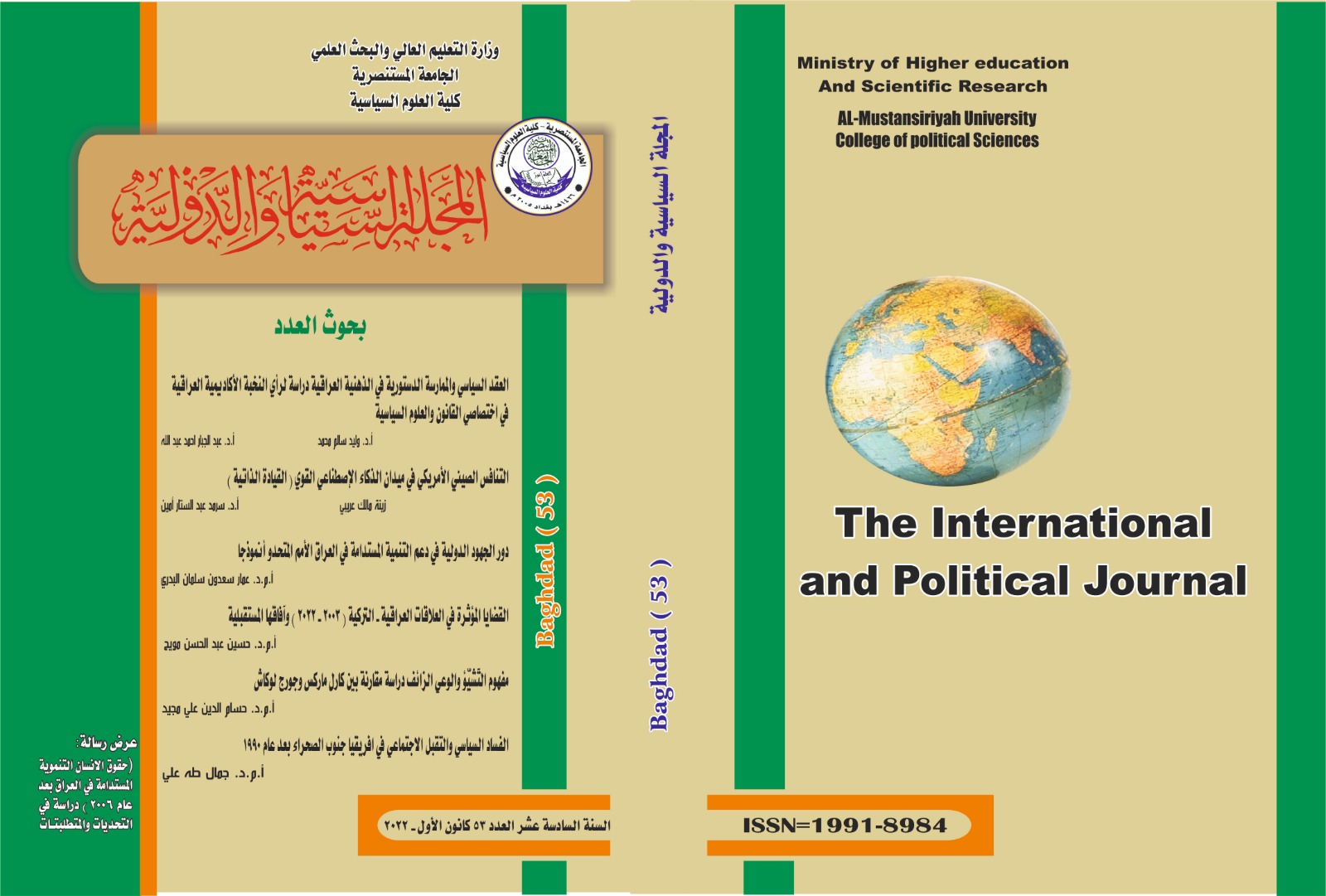Strategies for International Negotiation with Uncooperative Countries: North Korea as a Model
international and political journal
Keywords:
International Cooperation, Realism, Negotiation Strategies, North Korean Nuclear Crisis.Abstract
Despite the importance of international cooperation as the other face of international interactions in addition to conflict, and despite its importance in maintaining international peace and security and its inclusion in Article 1 of the United Nations Charter as the second goal of the international organization after maintaining international peace and security, its concept has not received consensus among schools of thought in international relations. While the realist theory, with its various intellectual trends, focused on the role of the state in achieving this cooperation to ensure mutual interests between states, the liberal theory, with its various trends, emphasized the role of international institutions in building this cooperation. Then, the constructivist theory added other variables that can contribute to the success of the state’s attempts in international cooperation strategies, such as identity and the social structure of the state. As long as the interests of states conflict and the components of strength and capacity they possess and the nature of the roles they play in the international system vary, states have different approaches to cooperation with other states and units of the international system in a way that ensures the achievement of these interests. This results in dividing states into states that cooperate with effective international organizations and powers and others that do not cooperate. There are many countries that do not cooperate with international strategies in some issues for various reasons, including the rejection of unilateral hegemony over the international system or the system of alliances that are linked to it or the nature of their roles in the conflict equations that they are based on regionally and internationally, such as North Korea. This imposes on the United Nations, the Security Council and the International Atomic Energy Agency, as the parties concerned with the North Korean nuclear program, to adopt negotiation strategies of a different nature in terms of stages, dialogues and tactics, due to the threat this program poses to the international balances that underlie the security and stability of East Asia and the international system in general.
This paper examines the concept of international cooperation, as well as defining negotiation strategies from a theoretical perspective and examining the international negotiation strategies adopted by the International Atomic Energy Agency, the Security Council, the United States of America, the Russian Federation and China with North Korea regarding its nuclear program.
Additional Files
Published
How to Cite
Issue
Section
License

This work is licensed under a Creative Commons Attribution 4.0 International License.
Journal Policies
All articles published in the International and Political Journal are licensed under a Creative Commons Attribution 4.0 International License. This means that the Authors can:
The journal allows reuse and remixing of content in accordance with a Creative Commons license.
Copy and redistribute the material in any medium or format.
Policy of publishing in The International and Political Journal
The journal is committed to the ethics of scientific publishing, and according to the publication ethics report of the journal.
The decision to publish is based on the value of the scientific research, to what extent it meets the conditions of publication approved, the declared policy of the journal, and its specialty.
It is based on the principles of the scientific honesty, and originality of research submitted for publication. It deals with the names of reviewers and their reports with great confidentiality.
The opinions published in the journal reflect the views of the authors, and not necessarily reflect the opinion of the editorial board.
The journal does not adhere to the publication of whatever comes to it. The time and place of publication are subject to technical considerations adopted in the editorial plan of the journal.
The journal does not abide to return the research papers to their owners whether accepted for publication or not.
The researcher is to be provided with the acceptance of publication within about 24 WEEKS. As for publication, the editorial board reserves its right in priority of publishing. The arrangement of the research papers in the same issue is subject to technical standards.
Diversify of publishing papers from solid universities and scientific centers from inside and outside Iraq is preferable.
The journal maintains hard copies and electronic archive of the published issues in addition to the publication of the research papers.
The journal also publishes the issues electronically through the website of the journal, and the official website of the Iraqi academic journals, and makes it possible to download. Thus, documenting the intellectual property of the research papers and publishing them internationally is achieved.
Terms of publication may be modified when necessary with no previous notice.
The researcher obtains a copy of his research paper. If he wishes to buy acopy of the journal, the volume costs ID 10000 from inside Iraq and $8from the outside.
The Editorial Board considers that the researcher who submits his research paper for publication in the journal has already read the terms and conditions of publication and agreed on them.
The journal publishes the research papers of the postgraduate students in special issues for this purpose.
Stages of editing and publishing:
The researcher undertakes that his research has never been published before, and has not been submitted for publication to other sides until the end of the evaluation procedures and the acceptance of publication in the journal.
The research papers submitted for publication are to subjected for preliminary examination by the editorial board to determine their suitability for the journal specialization, its policy and the safety of scientific research procedures, and then to indicate its eligibility for scientific evaluation. The editorial board may apologize for accepting the research all together or require the researcher to amend it in accordance with the journal policy before sending it to editors.
After conducting the scientific evaluation, the research paper returns back to the researcher to make the required amendments within a maximum of two weeks.
A copy of the final research paper is to be submitted to the secretariat of the journal a hard copy and a soft copy on a CD, in both Word and PDF format. The researcher is fully responsible for the typing and linguistic mistakes after submitting the full research paper on a CD.
Plagiarism checker
All research papers are subjected to Turnitin program to uncover plagiarism before being sent to scientific evaluation. The researcher undertakes a written pledge to take the legal and moral responsibility, in the event of the emergence of plagiarism or taking from the efforts of other researchers, without a reference to them. The journal uses appropriate anti-plagiarism software, such as Turnitin to check for plagiarism.
Dealing with Allegations of Research Misconduct
The Journal shall take reasonable and serious steps to identify and prevent the publication of papers where research misconduct has occurred, including plagiarism, citation manipulation, and data falsification/fabrication.
Scientific Evaluation:
Scientific evaluation strengthens the research paper submitted to the journal and helps to take the appropriate decision by the editorial board to publish it. It also benefits the researchers to improve and correct their research papers.
The research paper is sent to three evaluators in the same specialty to evaluate











